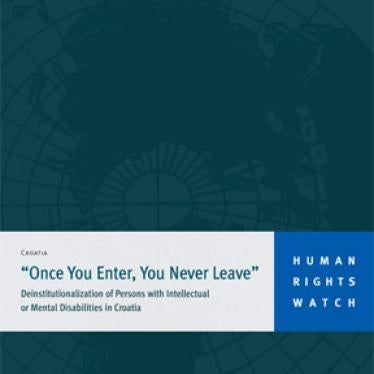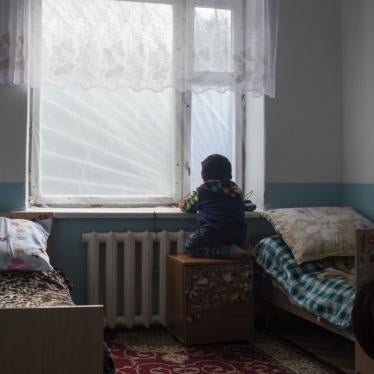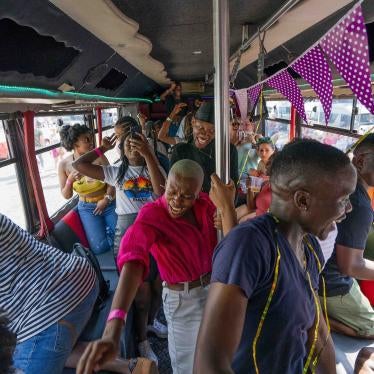For many in Europe, the western Balkans still evoke images of the brutal conflicts that followed the dissolution of Yugoslavia in the 1990s. The legacy of those wars continues to shape European Union and US policy toward the region.
Repairing the damage caused by those conflicts, holding those responsible accountable for war crimes and creating conditions for people who are still displaced to return remain important tasks. But focusing on those efforts has sometimes come at the expense of the rights of other vulnerable and marginalized people.
Governments in the region and international entities involved there share responsibility for that neglect. As the region seeks to move close to EU integration, it is important not to leave anyone behind.
One concern is for people with disabilities, who are marginalized across the region. Croatia is a case in point. Although it is the country in the region closest to becoming the next EU member, many Croatians with disabilities are denied their most basic rights.
More than 9,000 people with intellectual or mental disabilities, about one in every 500 Croatians, are in long-term residential institutions that strip them of their autonomy, privacy, and any chance at living a full life. They are forced to live in often-remote locations, in rooms with up to 12 other people. They cannot marry, have a family, or maintain a home or a normal job.
They are not even allowed to make the most basic choices, such as what to eat for dinner or when to go to bed. About seventy percent have been stripped of legal capacity, which means they cannot choose to leave the institution, where they remain effectively detained.
There are dozens of people with intellectual or mental disabilities, most of them former institution residents, who are successfully living with some support services in apartments in communities throughout Croatia. But these services-help maintaining their apartments, for example, or working at jobs-are available to only a very small fraction of people with intellectual or mental disabilities, while space in dignity-stripping institutions remains plentiful.
All pledges, no action
There is a significant gap between this reality and the commitments Croatia has made to the EU and the UN to promote disability rights and deinstitutionalization. Croatia is a party to the UN Convention on the Rights of Persons with Disabilities, but has not even published a plan for deinstitutionalization, let alone started taking any concrete action on such a plan.
Indeed, for more than a year it has promised Human Rights Watch that this plan will be finalized imminently. Croatia needs to honour and fulfil its commitments, and the EU needs to keep pushing the issue. If Croatia is to be the next EU member state, then it is important for it to make sure that all of its citizens can exercise their rights.
Another regional human rights issue is the status of Roma, Ashkali, and Egyptian (RAE) communities, who are often denied basic rights and face discrimination and marginalization. As Human Rights Watch has reported, this marginalization has been very acute in Kosovo, where these groups encounter the highest unemployment, school dropout, and mortality rates in the population.
Many remain displaced from their pre-war homes. The most notorious case documented by Human Rights Watch was about a group, including children, displaced from Mitrovica, who had been living in lead-contaminated camps, some for more than a decade, with disastrous health consequences.
In October, one of the camps, Cesmin Lug, was closed, and many of its residents resettled, and medical treatment for lead contamination is being provided. But a second camp, Osterode remains open, and the health effects from high-level, long-term lead exposure persist.
Forced returns to Kosovo
Governments in western Europe continue to deport members of these groups to Kosovo, with Kosovo's agreement but little or no assistance, despite the poor conditions and the calls to halt the returns by the United Nations Secretary-General and the Council of Europe Commissioner for Human Rights. While Albanians and Serbs are also forced back to Kosovo, the marginalization of and discrimination against Roma, Ashkali and Egyptian makes them particularly vulnerable to human rights abuse on return.
Many lack documentation, cutting them off from services and effectively leaving them stateless, while others lack even basic local language skills. In November 2009, we met a 20-year-old who had been deported to Kosovo from Germany only a few weeks before. He had spent more than half of his life in Germany and spoke only German. In such a situation where members of these groups already face discrimination and marginalization in access to housing, education, employment, and social welfare, it is not surprising that he and other returnees have not fared well in Kosovo.
Kosovo's government has developed a strategy for integrating returnees and for improving its practices to protect their rights, but it has done little to translate its plan into action. Western European countries should not return people to Kosovo until Pristina is able to guarantee basic conditions for reception and reintegration, and they need to encourage Kosovo's government to put its Roma strategy into practice.
Roma, Jews Politically Excluded
Another regional rights issue concerns Bosnia and Herzegovina. There, minority groups not specifically recognized in the constitution, including Jews and Roma, face near exclusion from national politics.
Western Europe and the United States are playing a more positive role in Bosnia, pushing for needed constitutional reforms including changes to the ethnic-based structure of politics. But the national government is not listening. Instead, political rivalry among parties representing the three main ethnic groups, the only ones whose views count at the highest level, has created political deadlock.
Each of these "constituent" ethnic groups has a designated position within the presidency and has access to a veto, preventing passage of legislation detrimental to that group. But other ethnic minorities have no such veto power, and their members cannot run for the presidency.
As long as the interests of these non-constituent minorities are excluded from political participation at the highest level, they are susceptible to exclusion in other areas of life in Bosnia, such as access to education, social services, and housing.
The European Court of Human Rights found in January 2010 that Bosnia's constitution, crafted by international governments at the end of the war, violates human rights law in blatantly discriminating against these ethnic groups in the political process. Despite this ruling, the Bosnian national government has done nothing to correct this situation.
Bosnia needs to amend its constitution to correct this discrimination. If it hopes to become a member of the EU, it needs to show that it is committed to promoting the human rights of those within its borders. The EU and the US should continue to pressure Bosnia to do so.
For too long in the Western Balkans, the concepts of justice and human rights have revolved largely around the legacy of war. If the governments in the region are serious about their aspirations for the EU, they need to demonstrate their commitment to justice for all.
Amanda McRae is the western Balkans researcher at Human Rights Watch.







